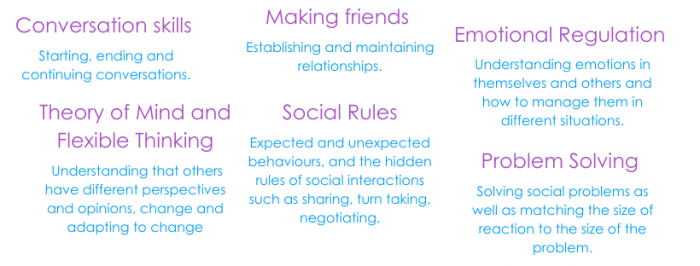
Our last blog Social Communication- What does it mean? talked about development of social communication skills and what you can do if you are concerned about your child’s social communication skills.
As outlined in our last blog we usually start with a Social Language Assessment which would include a mix of interviews (with family and teachers), checklists and informal tasks to see how your child performs in different environments and with different people as well as a language assessment. Following this assessment your therapist will work with you and your child to develop an individualised therapy plan. This will be based on the assessment results and observations as well as family priorities.
Common Social Communication targets include;

Social Communication therapy can be completed in;
Small TALK uses a number of different programs and strategies depending on the age skill level of each child. We understand the importance of an individual and adaptable approach to social communication therapy. We also know that as we grow social expectations and situations change and a child’s therapy needs to reflect this.
Two of our favourite curriculum based programs are Social Thinking We Thinkers! and Bridges in Social Understanding.
This curriculum is based on Social Thinking, a treatment methodology developed by Michelle Garcia Winner that teaches the “why” behind our social behaviour.
The We Thinkers! curriculum is divided into ten units that align with the ten storybooks. Each unit is designed to teach a specific Social Thinking concept based on one of the vocabulary terms.


We use a range of items from the Social Thinking curriculum and have found The We Thinkers book series great for the 4-10 year old age group. This curriculum teaches foundational social communication skills through stories and play. These concepts and ideas are then used to help children become flexible social thinkers and social problem solvers.
The 10 concepts include;
For our older kids 10+ we often use the Bridges curriculum. Bridges is an online computer based program developed in the UK by Catherine Pownell and Mary Yong.
Therapy sessions using Bridges follow weekly lessons that build a child’s social communication skills. The clinician is able to measure progress using the online baseline and progress tools, access lesson plans and engage with learning resources. The learning resources include video examples, role plays and interactive quizzes as well as take home handouts.
Older social learners are highly engaged with the online platform and are able to access all the resources from home to review which is great for family involvement and generalisation of learnt skills.
Topics addressed in Bridges include;
A Free trial is available, speak to your therapist about this today!
Lastly, we are strong believers in supporting our families to help our children develop these social communication skills in naturalistic and functional settings such as home, school and in the community. See below our top 5 tips for helping your child develop their social communication skills outside the clinic.
Top-5-tips-for-helping-social-skills-at-home.-